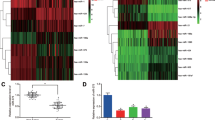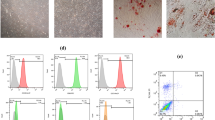Abstract
Background
Human umbilical cord mesenchymal stem cell-derived exosomes (hucMSC-exos) exhibit various roles in breast cancer development. The molecular mechanisms underlying hucMSC-exos in breast cancer cells are not fully clear. In the current study, we set out to investigate the downstream signaling pathways of hucMSC-exos in MCF-7 cells, a commonly used cell line to study breast cancer.
Methods
hucMSC-exos’ effects on MCF-7 cells were examined using immunocytochemistry. An inhibitor and a mimic of miR-21-5p were administered. The mRNA and protein levels of ZNF367 were analyzed using real-time quantitative reverse transcription PCR (qRT-PCR)and western blotting. Transwell assays were used to measure invasion and migration. Dual-luciferase assays were performed to investigate the binding sites between miR-21-5p and ZNF367. To manipulate expression, an overexpressing of ZNF367 approach was utilized.
Results
We confirmed that hucMSC-exos can be internalized by MCF-7 cells. hucMSC-exos dramatically inhibited migration and invasion behaviors through downregulation of ZNF367 and upregulation of miR-21-5p. miR-21-5p directly binds on 3′UTR of ZNF367. miR-21-5p mimic partially abolished overexpressed ZNF367-induced migration and invasion. In breast cancer tissues, there was a negative correlation between miR-21-5p and ZNF367 levels. The similar results were also obtained in human breast cancer MDA-MB-231 cells.
Conclusion
husMSC-exos are anti-oncogenic in MCS-7 cells. husMSC-exos suppress ZNF367 expression and promote miR-21-5p expression. miR-21-5p opposes ZNF367’s actions during breast cancer development. miR-21-5p direct binds ZNF367 3′UTR to inhibit ZNF367 expression. The interaction between miR-21-5p and ZNF367 may serve as a future therapeutic approach to improve breast cancer prognosis.







Similar content being viewed by others
References
Woolston C. Breast cancer: 4 big questions. Nature. 2015;527(7578):S120.
Lee Y, El Andaloussi S, Wood MJ. Exosomes and microvesicles: extracellular vesicles for genetic information transfer and gene therapy. Hum Mol Genet. 2012;21(R1):R125-134.
Bray F, Ferlay J, Soerjomataram I, Siegel RL, Torre LA, Jemal A. Global cancer statistics 2018: GLOBOCAN estimates of incidence and mortality worldwide for 36 cancers in 185 countries. CA Cancer J Clin. 2018;68(6):394–424.
Miller KD, Nogueira L, Mariotto AB, Rowland JH, Yabroff KR, Alfano CM, Jemal A, Kramer JL, Siegel RL. Cancer treatment and survivorship statistics, 2019. CA Cancer J Clin. 2019;69(5):363–85.
Wang KX, Xu LL, Rui YF, Huang S, Lin SE, Xiong JH, Li YH, Lee WY, Li G. The effects of secretion factors from umbilical cord derived mesenchymal stem cells on osteogenic differentiation of mesenchymal stem cells. PLoS ONE. 2015;10(3):e0120593.
Jiang Y, Jahagirdar BN, Reinhardt RL, Schwartz RE, Keene CD, Ortiz-Gonzalez XR, Reyes M, Lenvik T, Lund T, Blackstad M, et al. Pluripotency of mesenchymal stem cells derived from adult marrow. Nature. 2002;418(6893):41–9.
Zhang B, Wu X, Zhang X, Sun Y, Yan Y, Shi H, Zhu Y, Wu L, Pan Z, Zhu W, et al. Human umbilical cord mesenchymal stem cell exosomes enhance angiogenesis through the Wnt4/beta-catenin pathway. Stem Cells Transl Med. 2015;4(5):513–22.
Scheuring D, Viotti C, Kruger F, Kunzl F, Sturm S, Bubeck J, Hillmer S, Frigerio L, Robinson DG, Pimpl P, et al. Multivesicular bodies mature from the trans-Golgi network/early endosome in Arabidopsis. Plant Cell. 2011;23(9):3463–81.
Meng Y, Sun J, Wang X, Hu T, Ma Y, Kong C, Piao H, Yu T, Zhang G. Exosomes: a promising avenue for the diagnosis of breast cancer. Technol Cancer Res Treat. 2019;18:1533033818821421.
Singh R, Pochampally R, Watabe K, Lu Z, Mo YY. Exosome-mediated transfer of miR-10b promotes cell invasion in breast cancer. Mol Cancer. 2014;13:256.
Liu ZL, Wang H, Liu J, Wang ZX. MicroRNA-21 (miR-21) expression promotes growth, metastasis, and chemo- or radioresistance in non-small cell lung cancer cells by targeting PTEN. Mol Cell Biochem. 2013;372(1–2):35–45.
Sun LH, Tian D, Yang ZC, Li JL. Exosomal miR-21 promotes proliferation, invasion and therapy resistance of colon adenocarcinoma cells through its target PDCD4. Sci Rep. 2020;10(1):8271.
Re M, Magliulo G, Gioacchini FM, Bajraktari A, Bertini A, Ceka A, Rubini C, Ferrante L, Procopio AD, Olivieri F. Expression levels and clinical significance of miR-21-5p, miR-let-7a, and miR-34c-5p in laryngeal squamous cell carcinoma. Biomed Res Int. 2017;2017:3921258.
Chen C, Liu X, Chen C, Chen Q, Dong Y, Hou B. Clinical significance of let-7a-5p and miR-21-5p in patients with breast cancer. Ann Clin Lab Sci. 2019;49(3):302–8.
Wang H, Tan Z, Hu H, Liu H, Wu T, Zheng C, Wang X, Luo Z, Wang J, Liu S, et al. microRNA-21 promotes breast cancer proliferation and metastasis by targeting LZTFL1. BMC Cancer. 2019;19(1):738.
Asano H, Murate T, Naoe T, Saito H, Stamatoyannopoulos G. Molecular cloning and characterization of ZFF29: a protein containing a unique Cys2His2 zinc-finger motif. Biochem J. 2004;384(Pt 3):647–53.
Wu X, Zhang X, Yu L, Zhang C, Ye L, Ren D, Li Y, Sun X, Yu L, Ouyang Y, et al. Zinc finger protein 367 promotes metastasis by inhibiting the Hippo pathway in breast cancer. Oncogene. 2020;39(12):2568–82.
Wang T, Wang XG, Xu JH, Wu XP, Qiu HL, Yi H, Li WX. Overexpression of the human ZNF300 gene enhances growth and metastasis of cancer cells through activating NF-kB pathway. J Cell Mol Med. 2012;16(5):1134–45.
Jain M, Zhang L, Boufraqech M, Liu-Chittenden Y, Bussey K, Demeure MJ, Wu X, Su L, Pacak K, Stratakis CA, et al. ZNF367 inhibits cancer progression and is targeted by miR-195. PLoS ONE. 2014;9(7):e101423.
Zeng H, Li T, Zhai D, Bi J, Kuang X, Lu S, Shan Z, Lin Y. ZNF367-induced transcriptional activation of KIF15 accelerates the progression of breast cancer. Int J Biol Sci. 2020;16(12):2084–93.
Zhu W, Huang L, Li Y, Zhang X, Gu J, Yan Y, Xu X, Wang M, Qian H, Xu W. Exosomes derived from human bone marrow mesenchymal stem cells promote tumor growth in vivo. Cancer Lett. 2012;315(1):1–37.
Maleki M, Ghanbarvand F, Reza Behvarz M, Ejtemaei M, Ghadirkhomi E. Comparison of mesenchymal stem cell markers in multiple human adult stem cells. Int J Stem Cells. 2014;7(2):118–26.
Larios J, Mercier V, Roux A, Gruenberg J: ALIX- and ESCRT-III-dependent sorting of tetraspanins to exosomes. J Cell Biol. 2020;219(3).
Lobos-Gonzalez L, Bustos R, Campos A, Silva V, Silva V, Jeldes E, Salomon C, Varas-Godoy M, Caceres-Verschae A, Duran E, et al. Exosomes released upon mitochondrial ASncmtRNA knockdown reduce tumorigenic properties of malignant breast cancer cells. Sci Rep. 2020;10(1):343.
Tai YL, Chen KC, Hsieh JT, Shen TL. Exosomes in cancer development and clinical applications. Cancer Sci. 2018;109(8):2364–74.
Wang S, Su X, Xu M, Xiao X, Li X, Li H, Keating A, Zhao RC. Exosomes secreted by mesenchymal stromal/stem cell-derived adipocytes promote breast cancer cell growth via activation of Hippo signaling pathway. Stem Cell Res Ther. 2019;10(1):117.
Cheng L, Zhang K, Wu S, Cui M, Xu T. Focus on mesenchymal stem cell-derived exosomes: opportunities and challenges in cell-free therapy. Stem Cells Int. 2017;2017:6305295.
Si ML, Zhu S, Wu H, Lu Z, Wu F, Mo YY. miR-21-mediated tumor growth. Oncogene. 2007;26(19):2799–803.
Li Q, Li B, Li Q, Wei S, He Z, Huang X, Wang L, Xia Y, Xu Z, Li Z, et al. Exosomal miR-21-5p derived from gastric cancer promotes peritoneal metastasis via mesothelial-to-mesenchymal transition. Cell Death Dis. 2018;9(9):854.
Acknowledgements
We sincerely acknowledged the assistance given by the QingPu Branch of Zhongshan Hospital Affiliated to Fudan University, Shanghai, China for the present research.
Funding
None.
Author information
Authors and Affiliations
Contributions
All authors contributed to the study conception and design. Material preparation, data collection and analysis were performed by XS, LD and XT. The first draft of the manuscript was written by XS and all authors commented on previous versions of the manuscript. All authors read and approved the final manuscript.
Corresponding author
Ethics declarations
Conflict of interest
The authors declare no conflict of interest.
Additional information
Publisher's Note
Springer Nature remains neutral with regard to jurisdictional claims in published maps and institutional affiliations.
Supplementary Information
Below is the link to the electronic supplementary material.
12282_2021_1218_MOESM1_ESM.jpg
Supplementary Figure S1: Lentiviral vector mediates ZNF367 overexpression in MCF-7 cells. A and B. The relative mRNA and protein contents of ZNF367 were significantly overexpressed in MCF-7 cells that were transfected with oeZNF367. *** p < 0.001 vs oeNC (JPG 921 KB).
About this article
Cite this article
Du, L., Tao, X. & Shen, X. Human umbilical cord mesenchymal stem cell-derived exosomes inhibit migration and invasion of breast cancer cells via miR-21-5p/ZNF367 pathway. Breast Cancer 28, 829–837 (2021). https://doi.org/10.1007/s12282-021-01218-z
Received:
Accepted:
Published:
Issue Date:
DOI: https://doi.org/10.1007/s12282-021-01218-z




